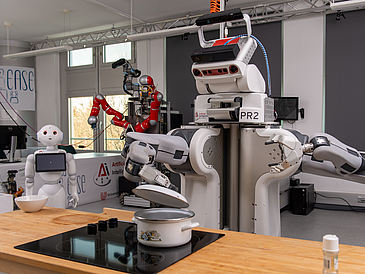The most important European centers in the field of robotics and artificial intelligence (AI) will cooperate closely within a network of excellence in the future. European robotics is thus establishing a cooperative infrastructure with the aim of assuming a leading international position in this disruptive research field with great economic and social potential. The coordinators of the network will include the University of Bremen, which has built up extensive expertise in the field of AI-based robotics in recent years. The other 30 actors from 14 countries include, for example, the University of Naples (Italy), ETH Zurich (Switzerland), the Royal Institute of Technology (Sweden), the German Aerospace Center (DLR) as coordinator, and several international industrial companies.
The "euROBIN" network is being funded by the European Union within the framework of Horizon Europe, the EU's central funding program for research and innovation. In this network, the University of Bremen coordinates the activities in the important research area "Knowledge Representation and Reasoning." In addition, Professor Michael Beetz's team contributes key elements for the development of an infrastructure for European collaboration.
"Great Success for our Focus on AI"
"Bremen is one of the smallest locations in the network, but we have been assigned one of the key roles," says the president of the University of Bremen, Professor Bernd Scholz-Reiter, happily. "This is a great success for our focus on artificial intelligence and especially AI-based robotics. It is an important step to anchoring us even more visibly in the European research landscape."
The partners in the euROBIN network see AI-based robotics as a particularly forward-looking topic that will gain massive importance in the coming years. The technologies developed in European centers of excellence are to be integrated into euROBIN and jointly developed further.
"We want to make substantial contributions to basic research in euROBIN"
"The network takes the cooperation of the European robotics scene to a new level," emphasizes Professor Michael Beetz, head of the Institute for Artificial Intelligence and the Collaborative Research Center EASE at the University of Bremen. "We want to make substantial contributions to basic research in euROBIN and make the potential of Bremen's innovation and transfer ecosystem internationally visible."
University Contributes to Building the Infrastructure for Intensive European Collaboration
With the research area "Knowledge Representation and Reasoning," Professor Beetz and his team not only coordinate one of the four scientific areas of the network, but also lead one of the nine work packages with specific research topics. In addition, the University of Bremen is also making a significant contribution to building the infrastructure for intensive European cooperation. Specifically, the establishment of a knowledge base under the name "EuroCore" (European Robotics Collaborative Repository) is planned. The university is providing an important building block for this with openEASE, a comprehensive web-based knowledge service for robots. "For Bremen as a science location, the role we are taking on in euROBIN is a great honor and an opportunity to responsibly help shape our research field together with the best European partners," says Beetz.
Senator: "Success confirms the strategic orientation of the state's science policy"
"I would like to congratulate the researchers involved on this success," says Bremen's science senator, Dr. Claudia Schilling. "It proves that Bremen's AI research has already gained international recognition and this success confirms the strategic direction of the state's science policy." Further strategically developing AI-based robotics in the state and positioning it as an international leader is a goal defined in the Science Plan 2025, she explains. "And it is a core aspect of the state's AI strategy 'Bremen.AI - Artificial Intelligence Strategy' to strengthen the unique features of AI-based robotics," the senator adds. "With this membership, Bremen's AI research can establish itself even further in the European research landscape."
Further Information:
https://www.uni-bremen.de/en/tzi
Contact:
Prof. Dr. Michael Beetz
University of Bremen
Phone: +49 421 218-64001
Email: mbeetzprotect me ?!uni-bremenprotect me ?!.de ; beetzprotect me ?!cs.uni-bremenprotect me ?!.de

